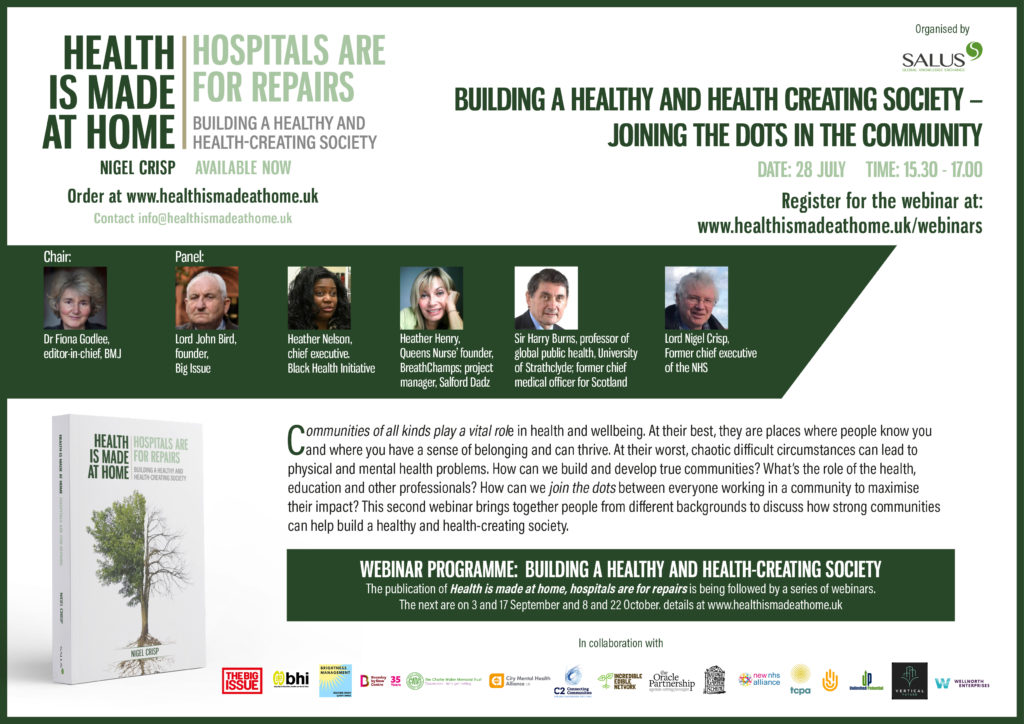The NHS has been magnificent during the pandemic, fighting for our lives over the last few weeks and months. But it’s been up to us, the general public, to limit how far and how fast the virus spreads.
Our behaviour has mattered. And millions have volunteered to help, kept community and voluntary activity going, or simply looked after our neighbours. Millions more have kept the vital non-health emergency and other services running in agriculture, retail, delivery, power, transport, finance, rubbish collection, and so much more.
Covid-19 has revealed many uncomfortable truths about our society—our dependence on the people who do the lowest paid and most insecure jobs, poverty, poor housing, the vulnerability of many children and the way different ethnic groups have been affected.
It has also shown to us all how important employment, housing and education are for our health and wellbeing. And what a vital role our communities play. Our wellbeing is intimately linked to the health of our communities and wider society in general.
It’s time to change the way we view health. Its not all about hospitals and the NHS. Or government policy. Important as these are. It’s about us and our behaviour and our society. As an African friend told me: “health is made at home, hospitals are for repairs.”
Health is made at home and in the community, the workplace, the school and the family
The NHS can’t do everything by itself. The NHS can’t deal with many of today’s major health problems such as loneliness, stress, obesity, poverty and addictions. It can only really react, doing the repairs, but not addressing the underlying causes.
But other sectors can and people all over the country are tackling these causes in their homes, workplaces and communities. These are the leaders and pioneers. People like the Berkshire teachers working with children excluded from school, the unemployed men in Salford improving their community, the bankers tackling mental health in the City, and many others.
They are dealing with the problems they see in front of them, Not waiting for government or the NHS to tell them what to do. They are breaking new ground, taking the initiative and leading. They are not just preventing disease, but creating health by creating the conditions for people to be healthy and helping them to be so.
There is a radical change underway. Each of us has responsibilities for our health. And employers, educators, architects, businesses and community leaders as well as government have a responsibility to create the conditions that enable us to live healthy lives. It’s not all the responsibility of the NHS. We need to take back control. And by doing so we will take pressure of the NHS and make sure it is always there when we need it.
A new settlement for health and wellbeing
Covid has changed the NHS. It has adapted with greater use of technology, better teamwork and swift decision making—and it is determined to maintain these gains. And the Government has taken on new and more interventionist roles in society that will be with us for many years to come.
Now, with our world disrupted by the pandemic, is the right time for us to act.
The NHS needs to work with the health creators in other sectors. It needs to embrace the idea of health creation and include it in a new and broader vision of creating a home and community based health and care system. To create a renewed focus on local communities and on relationships with local organisations, businesses and agencies in the shared endeavour of creating health and improving the quality of life.
The Government needs a new vision that recognises the importance of health and wellbeing alongside the economy and security, and confronts the divisions and inequalities revealed by the pandemic. It, too, needs to focus on quality of life, local communities and the causes of health and wellbeing. It needs to reform social care. And it needs to promote health creation, encouraging and incentivising all sectors to take responsibility and create health.
As importantly, it needs to change the way it works, moving away from a central planning and one size fits all mentality to identifying and working with local entrepreneurs, the health creators and others who are making improvements in their areas. Money will be very tight and needs to be spent where it will have most effect.
In 1948, the UK set up the NHS as a comprehensive health service “free at the point of need.” It was based on the Beveridge Report and was a great national coming together around the shared purpose of providing health services for everyone. It was part of a wider approach embracing education, housing, social support and much more.
We need another 1948 moment, a coming together of people from all the sectors that create health. Today’s new approach needs to be equally wide-ranging, recognising that healthy individuals depend on healthy communities, a healthy society and a healthy planet.
But there is no Beveridge to guide us today as we take on these problems, no blueprint for what we should be doing. Nor should there be. In today’s more democratic age we don’t need tablets of stone delivered from on high, but a future that is built bottom up.
We need to create the future for ourselves.
Nigel Crisp is a crossbench member of the House of Lords. He was Chief executive of the English NHS and Permanent Secretary of the UK Department of Health from 2000 to 2006. His latest book “Health is made at home, hospitals are for repairs” was published by Salus on in June 2020.
Competing interests: None declared
- Join a webinar on 28 July at 15h30-17h00 (BST), chaired by Fiona Godlee, editor in chief, The BMJ.

